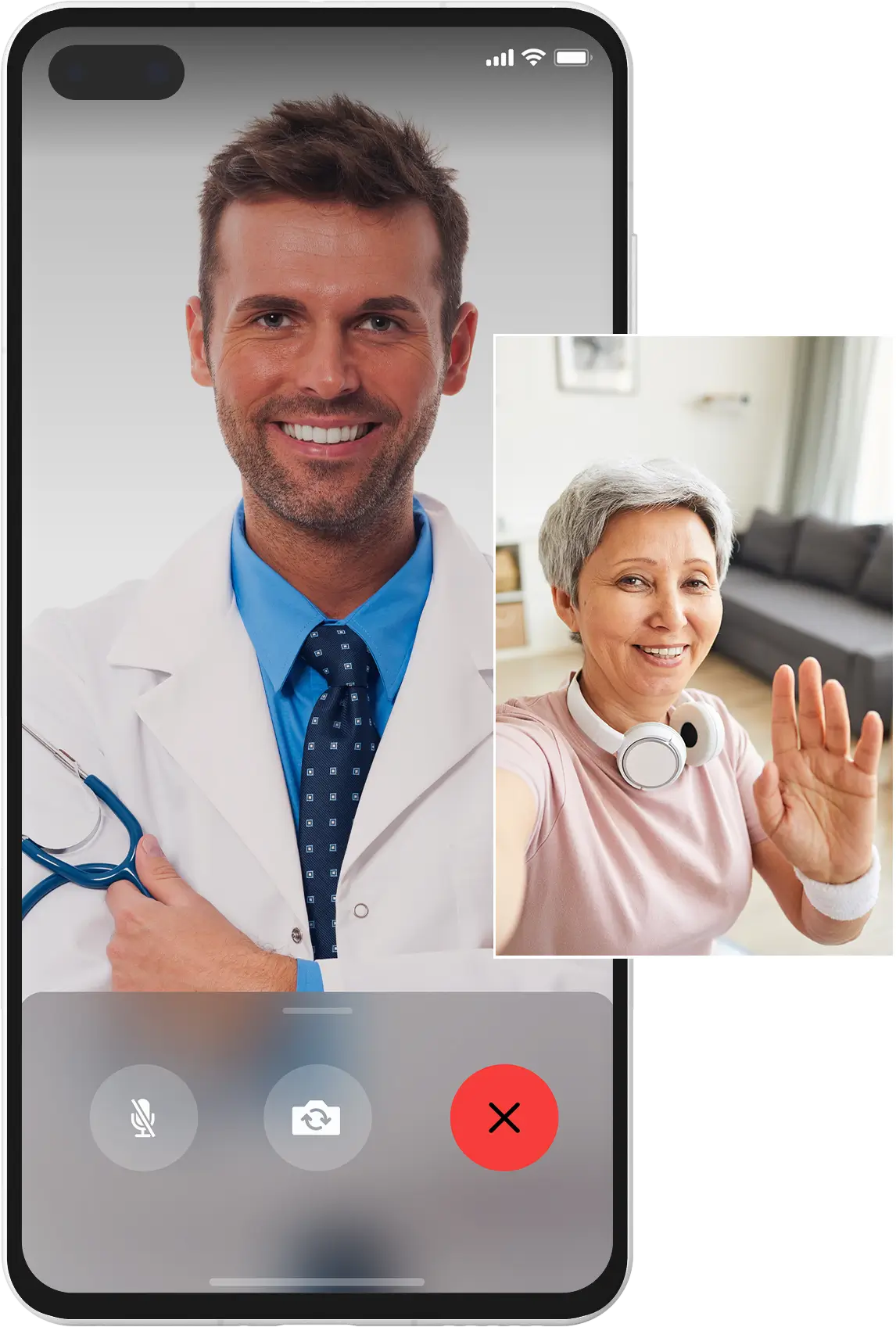Table of Contents
Join Now and Get Your First Consultation Free!
Secure your health with a yearly membership for just €29.90. Sign up today and enjoy peace of mind with expert care at your fingertips!
Get Started
Urologist Consultation Online
Feel too embarrassed to talk about urology issues in person? Discover how private online urology consultations offer expert advice from the comfort of your home. Learn what conditions can be treated, how virtual visits work, and why telehealth is transforming urologic care.
Embarrassed to Ask? Get Private Urology Advice Without Leaving Your Home
Some health concerns are just...awkward. Whether it's frequent urination, erectile dysfunction, or testicular pain, many people delay seeking help because they feel too embarrassed to bring it up. But avoiding these issues can lead to serious complications.
Thankfully, you no longer have to choose between suffering in silence or braving a waiting room. Telehealth in urology is here—giving you access to expert medical advice from the comfort, privacy, and safety of your own home.A urologist consultation online connects you with board‑certified specialists via secure video or phone, so you can discuss sensitive issues from the comfort of home.
Let’s explore how online urology consultations are breaking down barriers, improving access, and helping thousands of people get timely, expert care—backed by credible sources and trusted healthcare foundations.
What Is Urology Telehealth?
Telehealth in urology allows patients to speak directly with a urologist using secure video or phone consultations. Whether you’re at home, at work, or traveling, you can connect with a board-certified urology specialist to:
- Discuss symptoms
- Review lab or imaging results
- Follow up on treatments
- Ask sensitive questions in a judgment-free setting
According to the Urology Care Foundation, a telehealth appointment is much like an in-person visit—except it takes place over a secure video call or telephone [1]. Your doctor has access to your records, and you can talk freely about your symptoms, progress, and next steps.
What Can Be Treated or Discussed Online?
Many urologic concerns can be managed—or at least evaluated—via telehealth, including:
- Frequent urination
- Urinary tract infections (UTIs)
- Erectile dysfunction
- Prostate health concerns
- Testicular or groin pain
- Urinary incontinence
- Kidney stone management
- Post-operative care
While not every issue can be fully diagnosed virtually, your urologist can determine whether an in-person visit, imaging, or lab test is needed—and guide you efficiently through the process.
Why Many Patients Prefer Online Urology Appointments
1. Total Privacy and Comfort
Talking about urologic health can feel deeply personal. Telehealth lets you avoid the waiting room and awkward face-to-face moments, giving you more control and comfort.Explain how a urologist consultation online mirrors an in‑person visit through encrypted video, letting you review labs, discuss symptoms, and plan next steps without travel.
2. Saves Time and Stress
With telehealth, there’s:
- No driving or commuting
- No sitting in a crowded lobby
- No rearranging your entire day
Everything happens on your schedule, right from your phone, tablet, or computer.
3. Better Access to Specialists
For patients in rural or underserved areas, getting an appointment with a urologist used to mean long wait times or even traveling to another city. Now, patients can connect with experts from anywhere with internet access [1].
What to Expect in Your First Virtual Urology Visit
Here’s a step-by-step breakdown of how a telehealth visit works:
- Schedule the appointment just like a regular checkup.
- You'll receive a secure video or phone link to connect with your urologist.
- Before the call, you'll digitally confirm your medical info, medications, allergies, and insurance details.
- When your doctor joins the video, you can talk openly about your concerns.
- Your provider may prescribe medications, recommend next steps, or arrange for follow-up testing or imaging.
- After the visit, you'll get a summary through email or your patient portal—just like an in-person visit [1].
Tips to Prepare for a Private Telehealth Urology Visit
Want to make the most of your virtual consultation? Try the following:
- Choose a quiet, well-lit, private space for your appointment
- Make sure your device is charged and your internet connection is strong
- Use headphones or earbuds for added privacy
- Log in 10–15 minutes early to handle any tech issues
- Write down any symptoms, questions, or medications ahead of time
Is It Secure and Confidential?
Yes. Telehealth platforms used by licensed providers follow HIPAA-compliant standards. According to the Urology Care Foundation, these appointments often take place in private rooms using encrypted systems that match or exceed hospital security levels. Nothing is recorded, and your information is protected just as it would be during an office visit [1].
When In-Person Visits Are Still Necessary
While telehealth is excellent for many urologic concerns, some cases will still require an in-person evaluation. These might include:
- Physical examinations
- Blood work or lab tests
- Imaging studies (e.g., ultrasound, MRI)
- Surgical evaluations or procedures
But even in these situations, your telehealth visit is a valuable first step that saves time and helps your urologist prepare for your care plan.
Real Benefits, Backed by Evidence
Studies show that telehealth not only improves access, but also reduces missed appointments, improves satisfaction, and provides equal or better outcomes for certain types of follow-up care [2].
For many patients, especially those hesitant to seek help for urologic issues, this technology removes the biggest barriers: embarrassment, access, and time.
When You’re Ready, So Are We
There’s no shame in caring for your health—and you don’t have to leave home to do it.
Whether you’re dealing with a long-term condition or a new, uncomfortable symptom, online urology care offers expert advice, personalized support, and privacy—all on your terms.
Take the first step. You’ll be surprised how easy—and empowering—it can be.
References (Vancouver Style)
- Urology Care Foundation. Telehealth - What You Should Know. GeneralUrology-Telehealth-FS-2023-English. UrologyHealth.org. https://www.urologyhealth.org/
- Weinstein RS, Lopez AM, Joseph BA, et al. Telemedicine, Telehealth, and Mobile Health Applications That Work: Opportunities and Barriers. Am J Med. 2014;127(3):183–7. Available from: https://pubmed.ncbi.nlm.nih.gov/24384059/
Written by Diellza Rabushaj, Medical Writer and Researcher.
Recommended articles for You

Why headaches worsen in Ramadan—and practical steps that help.

New trial data suggests coffee may be safer—and possibly helpful—for some people with AF.

Evidence-based guide to vitamin C in pain management and postoperative recovery.


